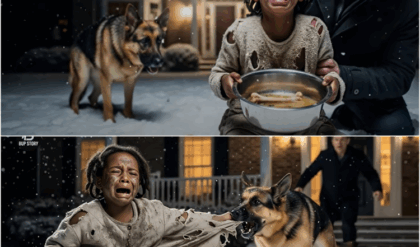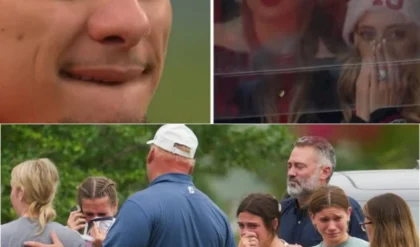The Guard Who Broke the Rules
The tourists had gathered outside Horse Guards Parade in London, their cameras raised, their voices hushed in reverence. For centuries, the Royal Guards had stood here, embodiments of discipline, ceremony, and unyielding silence. Their gleaming helmets caught the pale English sun, their scarlet tunics glowed like fire, and their horses—majestic, unflinching—seemed carved from bronze.
Among them stood Corporal James Whitaker, tall, broad-shouldered, his eyes hidden beneath the brim of his helmet. He was no stranger to the tourists’ fascination, nor to the weight of the tradition he bore. The oath of the guard was clear: never break formation, never react, never abandon post. His duty was not his own—it belonged to the Crown, to history itself.
Yet beneath the uniform was a man who, like any other, carried his private fears, his hopes, his memories. James had been a soldier for ten years, had trained in Afghanistan, had seen dust storms and fire, had watched comrades fall. Compared to war, standing still before Buckingham and Horse Guards Parade seemed almost absurd. But the discipline was the point. The immovable guard was a symbol—a reminder that duty outlasts fatigue, weather, or whim.
That morning was unremarkable at first. The crowd swelled as usual: families, couples, schoolchildren clutching Union Jack flags. James focused on his breathing, steady and controlled, the horse beneath him shifting its weight now and again. His mind drifted only slightly, recalling his own mother who used to wait at the school gate, waving as if she could never wave enough.
Then it happened.
A ripple of panic broke the calm. Somewhere near the front of the crowd, a woman stumbled. At first, James thought it was nothing more than the jostling of tourists. But then he saw her face: pale, drained of color, her knees buckling as if the ground itself had pulled her down. She collapsed, her hat falling askew, her bag sliding into the dust.
Gasps cut through the air. A child cried out. Someone shouted for help.
James’s heart lurched. Every instinct drilled into him screamed: Do not move. Do not break rank. His sergeant’s voice echoed in memory: You are not a man in those moments. You are the Guard. You are the Crown.
But another voice rose louder—the voice of the soldier, not the ceremonial figure. The man who had seen a boy bleed out in Helmand because no one acted quickly enough. The man who had promised, after all he’d seen, never to let someone die if he could help it.
For two eternal seconds, James wrestled with the code. His horse shifted, sensing his turmoil. Then, without further hesitation, he stepped forward, the sound of his boots cracking against the pavement like gunfire. The crowd parted in astonishment. A Royal Guard was moving—worse, he was breaking formation.
He strode across the short distance, his red tunic cutting through the sea of tourists. “Give her space,” he commanded, his voice deep, authoritative. The people obeyed instinctively, forming a circle around the fallen woman.
She was unconscious, her breathing shallow. A man—perhaps her husband—knelt beside her, his hands shaking helplessly. “Please,” he begged, “she just fainted, I think… she’s diabetic… I don’t know.”
James removed his gloves in one swift motion and knelt on the ground, his knees dirtying the immaculate crease of his trousers. He checked her airway, her pulse, his hands moving with calm efficiency. The years of combat medic training came back like muscle memory.
“Call for paramedics,” he ordered someone nearby. “And water. Quickly.”
The crowd buzzed with a strange electricity—half disbelief, half reverence. They had expected statues in scarlet. Instead, they were watching a man in uniform, fully human, his brow furrowed with concern.
The woman stirred faintly, her eyelids fluttering. James lifted her head gently, speaking in a low voice only she could hear. “You’re safe. Stay with me. Help is coming.”
The husband clutched his arm. “Thank you—thank you.”
Minutes later, the paramedics arrived, weaving through the mass of tourists. They worked seamlessly, placing her on a stretcher, fitting an oxygen mask over her face. One of them looked at James and nodded. “Good work, Corporal. You might’ve just saved her life.”
Only then did James rise, brushing the dust from his trousers, sliding his gloves back on. His helmet glinted again in the sun, and with a soldier’s quiet dignity, he turned, walked back to his post, and resumed position as though nothing had happened.
The crowd erupted into whispers, cameras clicking furiously. For many, it was the most human act they had ever witnessed from the stiff, silent guards. To them, the moment transcended ceremony. It was compassion breaking through steel.
Later, when the video surfaced online, the world reacted with awe. “The Guard who broke the rules,” the headlines read. “A man behind the uniform.” Some praised his humanity, others debated whether he had violated protocol. But for James, none of it mattered.
That night, when he finally removed his heavy uniform, he looked in the mirror. He saw not just the soldier of ceremony, but the man who had chosen kindness over rules.
And in that choice, he knew he had honored the Crown more deeply than if he had stood motionless while a life faded before him.





